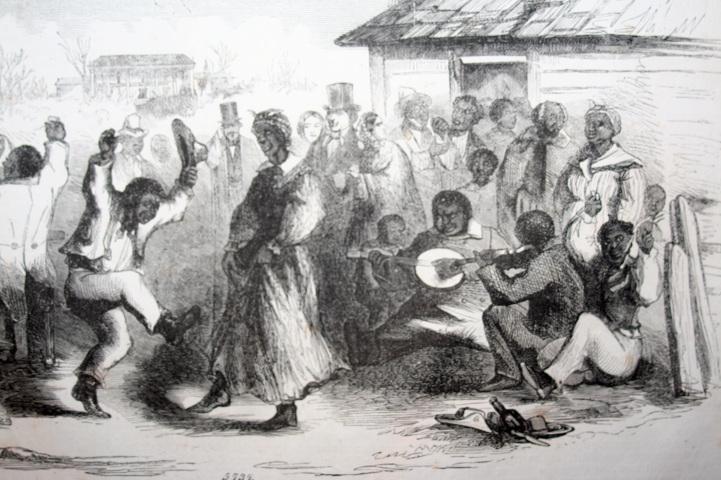African American, arguably, are the most religious people on this little rock called earth and have always been since arriving in this place the slaves called “merica”. With that said, I am sure many have wondered, in spite of the wretched system of slavery, how was it celebrated by the slave population?
The American slaves experienced the Christmas holidays in many different ways. Joy, hope, and celebration were naturally a part of the season for many. For other slaves, this holiday conjured up visions of freedom and even the opportunity to bring about that freedom. Still others saw it as yet another burden to be endured.
I suppose the enslaved African Americans; if there was ever any joy, it might well have been during the Christmas. At least their captures, in the spirit of Jesus’ birth allowed them to have a day free from drudgery. The prosperity and relaxed discipline associated with Christmas often enabled slaves to interact in ways that they could not during the rest of the year.
They may well have received material goods from their masters: perhaps the slave’s yearly allotment of clothing, an edible delicacy, or a present above and beyond what he or she needed to survive. For this reason, among others, slaves frequently married during the Christmas season – if it was allowed. More than any other time of year, Christmas provided slaves with the latitude and prosperity that made a formal wedding possible.
This ironic annual inversion of power occasionally allowed slaves to acquire real power. Henry, a slave whose tragic life and death is recounted in Martha Griffith Browne’s Autobiography of a Female Slave, saved “Christmas gifts in money” to buy his freedom. Some slaves saw Christmas as an opportunity to escape. They took advantage of a relaxed work schedules and the holiday travels of slaveholders, who were too far away to stop them.
While some slaveholders, presumably treated the holiday as any other workday, numerous authors record a variety of holiday traditions, including the suspension of work for celebration and family visits. Because many slaves had spouses, children, and family, who were owned by different masters and lived on other properties. Slaves often requested passes to travel and visit family during this time. Some slaves used the passes to explain their presence on the road and delay the discovery of their escape through their masters’ expectation that they would soon return from their “family visit.”
Jermain Loguen plotted a Christmas escape, stockpiling supplies and waiting for travel passes, knowing the cover of the holidays was essential for success: “Lord speed the day!–freedom begins with the holidays!” These plans turned out to be wise, as Loguen and his companions were almost caught crossing a river into Ohio, but were left alone because the white men thought they were free men “who have been to Kentucky to spend the Holidays with their friends”.
It was during Christmas that Harriet Tubman helped her brothers escape. Their master intended to sell them after Christmas but was delayed by the holiday. The brothers were expected to spend the day with their elderly mother but met Tubman in secret. She helped them travel north, gaining a head start on the master who did not discover their disappearance until the end of the holidays. Likewise, William and Ellen Crafts escaped together at Christmastime. They took advantage of passes that were clearly meant for temporary use.
“This same Jesus, whom the civilized world now worship as their Lord, was once lowly, outcast, and despised; born of the most hated people of the world . . . laid in the manger of a stable at Bethlehem . . . this Jesus is worshiped now”. For Ann, Christmas symbolized the birth of the very hope she used to survive her captivity. Not all enslaved African Americans viewed the holidays as a time of celebration and hope. Rather, Christmas served only to highlight their lack of freedom.
Frederick Douglass described the period of respite that was granted to slaves every year between Christmas and New Year’s Day as a psychological tool of the oppressor. In his 1845 Narrative, Douglass wrote that slaves celebrated the winter holidays by engaging in activities such as “playing ball, wrestling, running foot-races, fiddling, dancing, and drinking whiskey”. He took particular umbrage at the latter practice, which was often encouraged by slave owners through various tactics.
In My Bondage and My Freedom, Douglass concluded“the license allowed [during the holidays] appears to have no other object than to disgust the slaves with their temporary freedom, and to make them as glad to return to their work, as they were to leave it”. While there is no doubt that many enjoyed these holidays, Douglass acutely discerned that they were granted not merely in a spirit of charity or conviviality, but also to appease those who yearned for freedom, ultimately serving the ulterior motives of slave owners.
Now we know! And that is my Thought Provoking Perspective!
Make these books the gift that keeps on giving.











No comments:
Post a Comment